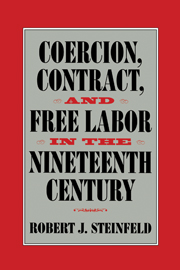Book contents
- Frontmatter
- Contents
- List of Illustrations and Tables
- Acknowledgments
- Introduction: Free Wage Labor in the History of the West
- PART ONE AMERICAN CONTRACT LABOR AND ENGLISH WAGE LABOR: THE USES OF PECUNIARY AND NONPECUNIARY PRESSURE
- 1 “Free” Contract Labor in the United States: An Anti-essentialist View of Labor Types I
- 2 “Unfree” Wage Labor in Nineteenth-Century England: An Anti-essentialist View of Labor Types II
- 3 Explaining the Legal Content of English Wage Labor
- 4 Struggles over the Rules: The Common Law Courts, Parliament, the People, and the Master and Servant Acts
- 5 Struggles under the Rules: Strategic Behavior and Historical Change in Legal Context
- 6 Struggles to Change the Rules
- 7 Freedom of Contract and Freedom of Person
- PART TWO “FREE” AND “UNFREE” LABOR IN THE UNITED STATES
- Conclusion
- Index
2 - “Unfree” Wage Labor in Nineteenth-Century England: An Anti-essentialist View of Labor Types II
Published online by Cambridge University Press: 06 July 2010
- Frontmatter
- Contents
- List of Illustrations and Tables
- Acknowledgments
- Introduction: Free Wage Labor in the History of the West
- PART ONE AMERICAN CONTRACT LABOR AND ENGLISH WAGE LABOR: THE USES OF PECUNIARY AND NONPECUNIARY PRESSURE
- 1 “Free” Contract Labor in the United States: An Anti-essentialist View of Labor Types I
- 2 “Unfree” Wage Labor in Nineteenth-Century England: An Anti-essentialist View of Labor Types II
- 3 Explaining the Legal Content of English Wage Labor
- 4 Struggles over the Rules: The Common Law Courts, Parliament, the People, and the Master and Servant Acts
- 5 Struggles under the Rules: Strategic Behavior and Historical Change in Legal Context
- 6 Struggles to Change the Rules
- 7 Freedom of Contract and Freedom of Person
- PART TWO “FREE” AND “UNFREE” LABOR IN THE UNITED STATES
- Conclusion
- Index
Summary
The history of wage labor in England has often been described as a movement from the statutes of laborers to free contract, from comprehensive state regulation of labor markets to laissez-faire back to comprehensive regulation. This book adopts some of that approach but introduces important modifications. The laissez-faire regime of free contract described in this and later chapters possesses characteristics that turn the traditional account on its head.
In the nineteenth century, free contract yielded “unfree” labor at least as often as it yielded “free” labor. It could do so because in important respects free contract is an empty idea. A regime of free contract only receives its content from a detailed set of contract rules, and these rules cannot be deduced from any abstract idea of contract. In most cases, the state develops contract rules as courts, legislatures, and other governmental bodies go about answering a series of difficult but unavoidable “policy” questions: What kinds of contracts will we enforce? What kinds of contracts will we prohibit or refuse to enforce? How will duress or fraud be defined in determining whether to enforce a contract, or to prohibit a certain species of contract? What formalities will be required to bind a party? What remedies will we make available to the parties for contract breach? What remedies for contract breach will we allow the parties to establish for themselves? A range of quite different regimes of free contract can be constructed, depending on how the political entity answers these questions. There can be no “natural” regime of contract, because there are no “natural” answers to these difficult questions.
- Type
- Chapter
- Information
- Publisher: Cambridge University PressPrint publication year: 2001
- 1
- Cited by



